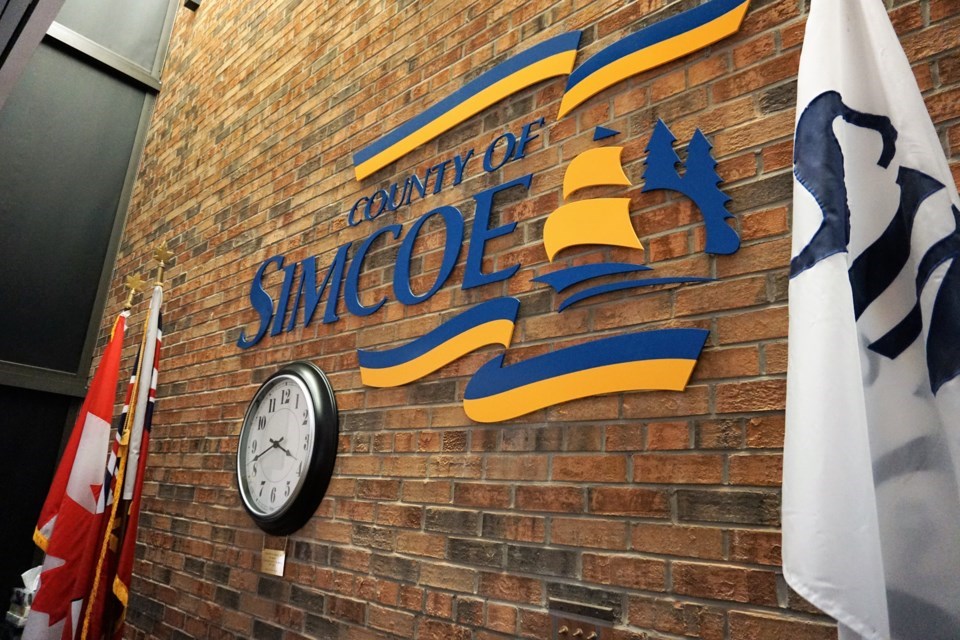After months of heated debate, the decision on whether to change in composition of Simcoe County council is now in the hands of the 16 member municipalities.
Councillors officially passed the bylaw during Tuesday’s council meeting which, if approved at the municipal level, would see county council be made up of only the mayors of the 16 lower-tier municipalities (towns and townships, as Barrie and Orillia are separated cities) and a head of council, who would be appointed by county council from among eligible electors who put their name forward and would only serve on county council.
Currently, the warden is appointed from among members of county council; that person serves on both county council as well as on their lower-tier council. Currently, Warden Basil Clarke is also the mayor of Ramara Township.
The proposed bylaw also includes required updates to the existing weighted vote system — a system based on the electoral size of each member municipality when a recorded vote is taken.
Despite being passed at the council level today, it's “not a done deal,” noted chief clerk Jonathan Magil.
“It has to achieve triple majority, so it will be sent to the lower-tier municipalities asking for their consent to the bylaw,” Magil said.
“There is concern from both sides. To me, this is about a shift of power. It is people on one side in rural areas that are concerned that they are losing that sober second thought,” Alternate Coun. Steffen Walma from Tiny Township said prior to the vote.
“When we make this switch, we are essentially shifting the power to eight people on the top half of the population scale versus 16 people," he added.
Today, county council considered an “olive branch,” Walma added, which was to look at the procedural bylaw, referring to a discussion earlier in the meeting that saw council approve a motion put forward by Wasaga Beach Mayor Brian Smith asking the governance committee to consider and make recommendations regarding circumstances for use of the weighted vote.
“I am glad that motion passed, because now I can support going to the 16. The other way, I wouldn’t have been able to,” said Walma.
Scott Anderson, who's the mayor of Adjala-Tosorontio Township, was not in support of the reduction.
“I don’t think it’s the right choice. I think it’s the easy choice,” he said. “We have multiple municipalities … who have not been afforded the opportunity to grow, which is, in effect, caused a disparity between members here at this table. The concern is you had the opportunity to grow and everyone had equal share, by all means the vote would be fine.”
The weighted vote bylaw was created in 2002, said Anderson, adding he believes the parity then is likely very different than it is now.
“The ratio of an increase of every 2,000 in population for a vote, maybe that needs to be 10,000. For years, (Adjala-Tosorontio) was told we can’t grow … and that has resulted in me not having a weighted vote here at the county council.”
Smith said he believed it is not about being larger or smaller, but rather what is fair and equitable to all communities, adding he believed it’s important to look at when a weighted vote is used.
“Today, again, is another excellent example of using the weighted vote to attempt to get what it is you require," said the Wasaga Beach mayor. "What really concerns me is today, a vote was taken, the majority said one thing … but then there was the opportunity for a member to ask for a recorded vote, which … fortunately in this case it didn't change the outcome."
The weighted vote was created to make sure there was proportional representation, said New Tecumseth Deputy Mayor Stephanie MacLellan.
“That’s equitable. If we want to go one-for-one … then let’s split the county tax levy one-sixteenth. If we are being equal, let’s be equal. That would be the cost of my weighted vote is that we send equal amounts of money to the county, too.”
The reason we would have a weighted vote, said Collingwood Mayor Yvonne Hamlin, is that it is more efficient than the alternative, which would be having enough councillors to represent their populations.
"We can sit here as a 40- or 60-member … and would be wildly different. That’s the alternative. That’s why we ended up, I am sure, with weighted votes because it’s too unwieldy to have a house that big,” she said.
In a recorded vote, the composition bylaw was approved 91 to 54, using the weighted vote system.
As for when this item would make its way to the member municipalities, Magil said the expectation is that it will happen “soon.”
“We had thrown out the end of June initially, but we might give municipalities a little bit more time to consider, given this report was written in March,” he said.




